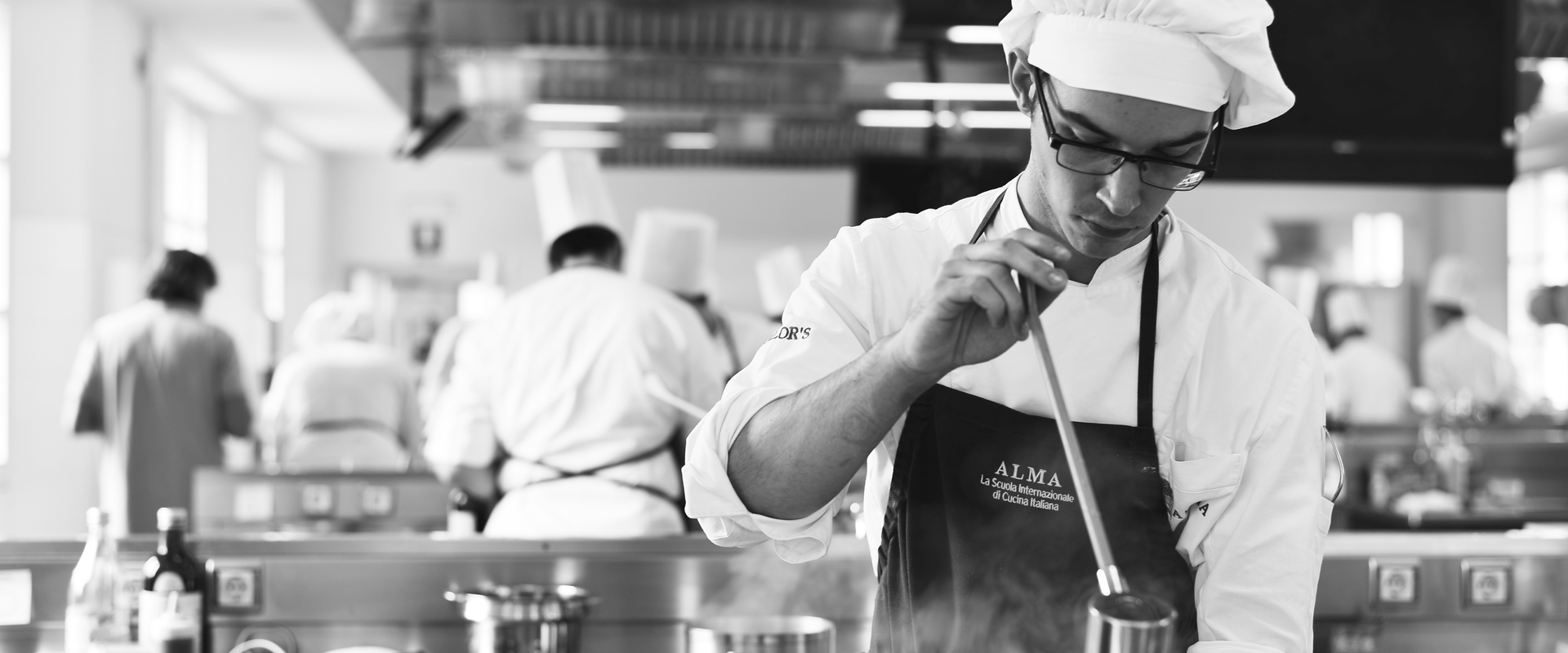Alma-International School of Italian Cuisine: the secret to its success.
2018-02-12
And it’s not only the building that’s spectacular: the curriculum is too.
ALMA International School of Italian Cuisine is located in the splendid Ducal Palace in Colorno, renovated in the early eighteenth century by architect Ferdinando Bibbiena for Duke Francesco Farnese, only a few kilometres outside
Parma, a
UNESCO Creative City for Gastronomy and heart of Italy’s
Food Valley.
The school is
Italy’s first and foremost professional training centre for the international hospitality and restaurant industries and trains chefs, pastry chefs, sommeliers, waiters, bartenders and managers to work in the restaurant industry all over the world.
The school is equipped with
the most advanced teaching equipment for learning about the latest new techniques as well as the wisdom of tradition and the practice and culture of food, product of the knowledge of raw materials and territories in the world of Italian food and wines.
“
I believe ALMA’s consolidated success,” says president
Enzo Malanca,
is primarily due to the quality of its Advanced Course in Italian Cuisine, which is unlike any other in the world in terms of the breadth and importance of its teachings.”
Since it was founded in 2004, “
ALMA has expanded the programmes it offers and developed additional courses offering the same level of quality and depth of study, such as the Advanced Pastry Course, the Advanced Course of Restaurant, Bar & Sommellerie Management, the Sommelier Master Programme and the Restaurant Managers’ Programme”.
Another important element that has contributed to ALMA’s success is its
international vocation: “
It has created courses for international students, which have attracted a lot of interest, thanks in part to the truly innovative creation of an international network of twenty advanced cooking schools, essential for promoting dialogue, also on a cultural level.”
The school also collaborates with
more than seven hundreds of Italy’s best restaurants and pastry shops and all the greatest enterprises serving the restaurant industry in Italy to organise apprenticeships for students. ALMA’s instructors include top Italian chefs and pastry chefs whose achievements have been acknowledged by the world’s greatest restaurant guides and experienced academic consultants who hold residential seminars. The rector of the school is the great chef
Gualtiero Marchesi.
If ALMA has been, and continues to be, so successful, and the best ambassadors of the school are its own pupils, Italian and international, who recommend the school’s programmes to their friends, there is a secret behind it. Actually, two secrets. “
The professionalism of the instructors and the dedication of the entire teaching staff,” concludes Malanca.
More than 80% of all graduates find employment within six months of graduating. Thanks in part to the way the school helps graduates find employment through its ALMAlink platform
Along with its top quality teaching,
ALMA International Italian Cooking School in Colorno, just outside Parma, guarantees a high employment rate for graduates.
As general director
Andrea Sinigaglia explains, “
ALMA was created more than thirteen years ago as a specialised institute for training professional chefs and pastry chefs, as an ideal continuation after attending a hotel and catering school. But about half our students now come from completely different backgrounds: with degrees in subjects that have nothing to do with food and wine, or people who leave their jobs to learn a new profession.”
About two thousand students attend the school every year, including two Basic Italian Cuisine and Pastry Courses, Advanced Italian Cooking and Pastry Courses, the Restaurant Manager’s Programme, the ALMA/AIS Master Sommelier Programme, the Advanced Bar Service and Sommellerie Programme, courses specially designed for international students in ALMA’s international network and tailor-made courses created on request for enterprises.
ALMA’s excellence is also apparent in the statistics. 36.6% of the school’s former students are already working in the restaurant industry by the time they get their diploma (which is confirmed in the place where they undergo on-the-job training). Another 40.8% of the school’s graduates find work within three months of graduation. 8.2% more find work within six months, 3.7% within a year.
The rate of employment of ALMA graduates within six months of graduating is therefore more than 80%.
72.8% of the school’s graduates work in Italy, 18.5% in another European country, 8.7% outside the European Union. For ALMA has an
international network including twenty of the world’s most prestigious Cooking Schools, in countries such as Canada, the USA, Mexico, Brazil, Argentina, the United Kingdom, Switzerland, Croatia, Turkey, Russia, South Africa, India, Malaysia, South Korea, Japan, Taiwan and Australia. ALMA organises Italian cooking courses for students from these schools with an interpreter.
“
When they start work, ALMA assists its graduates with ALMAlink, a portal allowing businesses to contact the school’s graduates and publish free want ads cooking, pastry cooking, bar and sommellerie and restaurant management professionals.”
This web platform created exclusively for the school’s graduates with a database of more than two thousand profiles means that employment is not just a prospect for ALMA graduates, but a real
opportunity. “
We want out students to get a job, not just a diploma,” concludes Sinigaglia.
Mariagrazia Villa
Photos: Foto Carra
